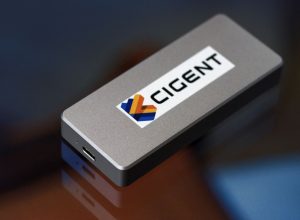 SECURITY
SECURITY
 SECURITY
SECURITY
 SECURITY
SECURITY
Cigent Technology Inc. today said it closed a $7.6M Series A funding round to develop and sell its technology that protects against ransomware, data theft and malicious insider attacks by applying security at the file level.
Cigent Data Defense uses both software and hardware to prevent data from being stolen even after a network has been breached. The company’s technology applies zero-trust access controls at the file level and uses multifactor authentication and encryption to secure files in any location including cloud data stores and transmitted as email attachments.
It comes in a software-only form but is most effective when used with the company’s proprietary secure solid-state storage devices (pictured, below), which Cigent sells and plans to license through original equipment makers. The patented technology, which was originally built under contract for U.S. government agencies, is described as “self-defending storage” that uses active and embedded machine learning-based ransomware detection and proprietary firmware-based protections.
Ransomware has been a growing problem during the pandemic as attackers have zeroed in on lightly defended home computers. Risk Based Security Inc. reported in January that ransomware attacks doubled in 2020 over 2019.
Cigent was about three years ago from CPR Tools Inc., a prominent forensic recovery tools and services company. In addition to its venture funding, the company also has nondilutive support from the U.S. Air Force and some government intelligence agencies, said Chief Executive Brad Rowe.
Its approach “pushes data protections as far down to the data as possible so an adversary’s intention sit doesn’t matter,” said Chief Technology Officer Greg Scasny. “We treat everything as hostile and put in protections that only allow the person who is supposed to access that data access the data.”

Cigent SSD Photo: Cigent
Multifactor authentication of the file level is independent of the location of the data and requires Cigent’s software for access. Machine learning algorithms can detect ransomware-driven efforts to encrypt a file and protect it from being accessed. “We’ve had a team of data scientists working on this algorithm for about five man-years to boil it down to about 50 different characteristics of ransomware,” Scasny said.
The software works with the Windows file system for permissions but does not require that Windows be used on the target machine. The company said it’s also working on versions for the Linux and Macintosh file systems.
When used with the company’s SSDs, administers can configure additional protections such as making entire drives invisible or securing portions of the drive. Data is encrypted at the hardware level and overlaid with software protection.
The custom SSDs come in configurations ranging from 512 gigabytes to 2 terabytes at prices of between $300 and $1,000. Executives said they don’t expect sales of storage equipment to be a major revenue source but are licensing their firmware to storage companies to embed in their own SSDs. Multiple storage companies have signed up for licenses, but they declined to provide specifics.
The funding was led by In-Q-Tel Inc., CyberJunction, WestWave Capital LLC and several individuals, including Avie Tevanian, who was formerly Apple Inc.’s chief software technology officer, and Tom Paquin, co-founder of Netscape Communications Corp. and Mozilla Corp.
Support our mission to keep content open and free by engaging with theCUBE community. Join theCUBE’s Alumni Trust Network, where technology leaders connect, share intelligence and create opportunities.
Founded by tech visionaries John Furrier and Dave Vellante, SiliconANGLE Media has built a dynamic ecosystem of industry-leading digital media brands that reach 15+ million elite tech professionals. Our new proprietary theCUBE AI Video Cloud is breaking ground in audience interaction, leveraging theCUBEai.com neural network to help technology companies make data-driven decisions and stay at the forefront of industry conversations.